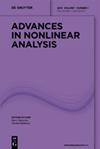Thresholds for the existence of solutions to inhomogeneous elliptic equations with general exponential nonlinearity
IF 3.7
1区 数学
Q1 MATHEMATICS
引用次数: 2
Abstract
Abstract In this paper we study the existence and the nonexistence of solutions to an inhomogeneous non-linear elliptic problem (P) −Δu+u=F(u)+κμ in RN, u>0 in RN, u(x)→0 as |x|→∞, - \Delta u + u = F(u) + \kappa \mu \quad {\kern 1pt} {\rm in}{\kern 1pt} \quad {{\bf R}^N},\quad u > 0\quad {\kern 1pt} {\rm in}{\kern 1pt} \quad {{\bf R}^N},\quad u(x) \to 0\quad {\kern 1pt} {\rm as}{\kern 1pt} \quad |x| \to \infty , where F = F(t) grows up (at least) exponentially as t → ∞. Here N ≥ 2, κ > 0, and μ∈Lc1(RN)\{0} \mu \in L_{\rm{c}}^1({{\bf R}^N})\backslash \{ 0\} is nonnegative. Then, under a suitable integrability condition on μ, there exists a threshold parameter κ* > 0 such that problem (P) possesses a solution if 0 < κ < κ* and it does not possess no solutions if κ > κ*. Furthermore, in the case of 2 ≤ N ≤ 9, problem (P) possesses a unique solution if κ = κ*.具有一般指数非线性的非齐次椭圆型方程解存在性的阈值
摘要本文研究了一个非齐次非线性椭圆型问题(P)-Δu+u=F(u)+κμ解的存在性和不存在性 在里面 RN, u> 0 在里面 RN, u(x)→0 像 |x|→∞, - \Δu+u=F(u)+\kappa\mu\quad{\kern 1pt}→ ∞. 这里N≥2,κ>0,并且L_{\rm{c}}^1({\bf R}^N})\反斜杠\{0}中的μ∈Lc1(RN)\{0}\mu是非负的。然后,在μ上的一个合适的可积条件下,存在一个阈值参数κ*>0,使得问题(P)在0<κ<κ*时具有解,而在κ>κ*时不具有无解。此外,在2≤N≤9的情况下,如果κ=κ*,则问题(P)具有唯一的解。
本文章由计算机程序翻译,如有差异,请以英文原文为准。
求助全文
约1分钟内获得全文
求助全文
来源期刊

Advances in Nonlinear Analysis
MATHEMATICS, APPLIED-MATHEMATICS
CiteScore
6.00
自引率
9.50%
发文量
60
审稿时长
30 weeks
期刊介绍:
Advances in Nonlinear Analysis (ANONA) aims to publish selected research contributions devoted to nonlinear problems coming from different areas, with particular reference to those introducing new techniques capable of solving a wide range of problems. The Journal focuses on papers that address significant problems in pure and applied nonlinear analysis. ANONA seeks to present the most significant advances in this field to a wide readership, including researchers and graduate students in mathematics, physics, and engineering.
 求助内容:
求助内容: 应助结果提醒方式:
应助结果提醒方式:


